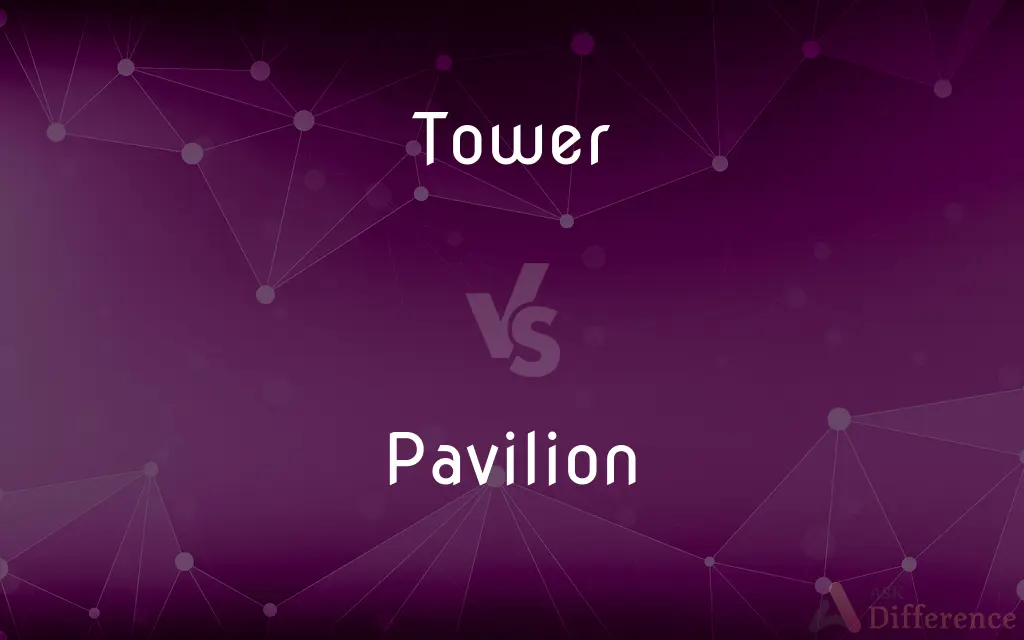Tower vs. Pavilion — What's the Difference?

Difference Between Tower and Pavilion
ADVERTISEMENT
Compare with Definitions
Tower
A tower is a tall structure, taller than it is wide, often by a significant factor. Towers are distinguished from masts by their lack of guy-wires and are therefore, along with tall buildings, self-supporting structures.
Pavilion
In architecture, pavilion has several meanings: It may be a subsidiary building that is either positioned separately or as an attachment to a main building. Often it is associated with pleasure.
Tower
A tall, narrow building, either free-standing or forming part of a building such as a church or castle
The south-west tower is a wonderful example of late Gothic
Pavilion
A building at a cricket ground or other sports ground, used for changing and taking refreshments.
Tower
A tall structure that houses machinery, operators, etc.
A control tower
ADVERTISEMENT
Pavilion
A summer house or other decorative building used as a shelter in a park or large garden.
Tower
Rise to or reach a great height
He seemed to tower over everyone else
Pavilion
An ornate tent.
Tower
(of a bird) soar to a great height, especially (of a falcon) so as to be able to swoop down on the quarry.
Pavilion
A light, sometimes ornamental roofed structure, used for amusement or shelter, as at parks or fairs
A picnic pavilion.
Tower
A building or part of a building that is exceptionally high in proportion to its width and length.
Pavilion
A usually temporary structure erected at a fair or show for use by an exhibitor
The French pavilion at the World's Fair.
Tower
A tall, slender structure used for observation, signaling, or pumping.
Pavilion
A large structure housing sports or entertainment facilities; an arena.
Tower
One that conspicuously embodies strength, firmness, or another virtue.
Pavilion
A structure or another building connected to a larger building; an annex.
Tower
(Computers) A computer system whose components are arranged in a vertical stack and housed in a tall, narrow cabinet.
Pavilion
One of a group of related buildings forming a complex, as of a hospital.
Tower
To appear at or rise to a conspicuous height; loom
"There he stood, grown suddenly tall, towering above them" (J.R.R. Tolkien).
Pavilion
The lower surface of a brilliant-cut gem, slanting outward from the culet to the girdle.
Tower
To fly directly upward before swooping or falling. Used of certain birds.
Pavilion
To cover or furnish with or as if with a pavilion.
Tower
To demonstrate great superiority; be preeminent
Towers over other poets of the day.
Pavilion
To put in or as if in a pavilion.
Tower
A very tall iron-framed structure, usually painted red and white, on which microwave, radio, satellite, or other communication antennas are installed; mast.
Pavilion
An ornate tent.
Tower
A similarly framed structure with a platform or enclosed area on top, used as a lookout for spotting fires, plane crashes, fugitives, etc.
Pavilion
A light roofed structure used as a shelter in a public place.
Tower
A water tower.
Pavilion
A structure, sometimes temporary, erected to house exhibits at a fair, etc.
Tower
A control tower.
Pavilion
(cricket) The building where the players change clothes, wait to bat, and eat their meals.
Tower
Any very tall building or structure; skyscraper.
The Sears Tower
Pavilion
A detached or semi-detached building at a hospital or other building complex.
Tower
(figuratively) An item of various kinds, such as a computer case, that is higher than it is wide.
Pavilion
The lower surface of a brilliant-cut gemstone, lying between the girdle and collet.
Tower
(informal) An interlocking tower.
Pavilion
(anatomy) The cartiliginous part of the outer ear; auricle.
Tower
(figurative) A strong refuge; a defence.
Pavilion
(anatomy) The fimbriated extremity of the Fallopian tube.
Tower
(historical) A tall fashionable headdress worn in the time of King William III and Queen Anne.
Pavilion
(military) A flag, ensign, or banner.
Tower
(obsolete) High flight; elevation.
Pavilion
A flag or ensign carried at the gaff of the mizzenmast.
Tower
The sixteenth trump or Major Arcana card in many Tarot decks, usually deemed an ill omen.
Pavilion
(heraldry) A tent used as a bearing.
Tower
(cartomancy) The nineteenth Lenormand card, representing structure, bureaucracy, stability and loneliness.
Pavilion
A covering; a canopy; figuratively, the sky.
Tower
One who tows.
Pavilion
(transitive) To furnish with a pavilion.
Tower
(intransitive) To be very tall.
The office block towered into the sky.
Pavilion
(transitive) To put inside a pavilion.
Tower
(intransitive) To be high or lofty; to soar.
Pavilion
To enclose or surround (after Robert Grant's hymn line "pavilioned in splendour").
Tower
To soar into.
Pavilion
A temporary movable habitation; a large tent; a marquee; esp., a tent raised on posts.
Tower
A mass of building standing alone and insulated, usually higher than its diameter, but when of great size not always of that proportion.
Pavilion
A single body or mass of building, contained within simple walls and a single roof, whether insulated, as in the park or garden of a larger edifice, or united with other parts, and forming an angle or central feature of a large pile.
Tower
A citadel; a fortress; hence, a defense.
Thou hast been a shelter for me, and a strong tower from the enemy.
Pavilion
A flag, colors, ensign, or banner.
Tower
A headdress of a high or towerlike form, fashionable about the end of the seventeenth century and until 1715; also, any high headdress.
Lay trains of amorous intriguesIn towers, and curls, and periwigs.
Pavilion
Same as Tent (Her.)
Tower
High flight; elevation.
Pavilion
That part of a brilliant which lies between the girdle and collet. See Illust. of Brilliant.
Tower
To rise and overtop other objects; to be lofty or very high; hence, to soar.
On the other side an high rock towered still.
My lord protector's hawks do tower so well.
Pavilion
The auricle of the ear; also, the fimbriated extremity of the Fallopian tube.
Tower
To soar into.
Pavilion
A covering; a canopy; figuratively, the sky.
The pavilion of heaven is bare.
Tower
A structure taller than its diameter; can stand alone or be attached to a larger building
Pavilion
To furnish or cover with, or shelter in, a tent or tents.
The field pavilioned with his guardians bright.
Tower
Anything tall and thin approximating the shape of a column or tower;
The test tube held a column of white powder
A tower of dust rose above the horizon
A thin pillar of smoke betrayed their campsite
Pavilion
Large and often sumptuous tent
Tower
A powerful small boat designed to pull or push larger ships
Tower
Appear very large or occupy a commanding position;
The huge sculpture predominates over the fountain
Large shadows loomed on the canyon wall
Share Your Discovery

Previous Comparison
Sensor vs. Electrode
Next Comparison
Crush vs. Attraction














































